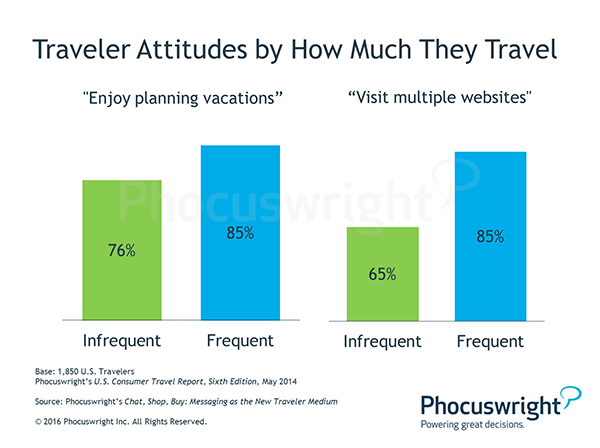Will Messaging Really Work as a UI for Travel Search Shop Buy?
- Published:
- June 2016
- Analyst:
- Douglas Quinby
Is mobile messaging really redefining the trip-planning and booking process? And if so, for how many of us? Watch Douglas Quinby's video below for insight into this new technology, as well as the consumer most likely to use it.
Corresponding Webinar and White Paper, Sponsored by OpenMarket Inc.
- June 23 Free Webinar – Register Now
- Free White Paper – Download
Prefer to read the text vs. watch the video? Read the video script below.
It's the topic everybody in travel has been talking about: mobile messaging as the next great breakthrough. Industry media are buzzing about it with increasing frequency. The New York Times just wrote about it. One startup investor has hailed messaging-based travel planners as the ultimate "OTA killer." But will messaging really redefine the travel planning and booking experience?
There are certainly plenty of startups having a go at it, one way or another. By my count at least 14:
30SecondsToFly
Assist
Chatnbook
Emma
ETA
GoHero.ai
HelloGbye
Hyper
Lola
Magic
Operator
Pana
Scout
Skylark
And several established companies, such as KAYAK, Skyscanner, Expedia, even Google, are dipping their toes into the arena with travel-related chatbots.
There are a lot of differences among these mobile messaging travel planners, such as the travel segments they focus on, the business models, the extent to which their conversational UI is powered by algorithms, humans or a blend of both. But all seem to be placing a big bet that travelers will welcome a conversational user experience offering a small, curated set of options rather than a comprehensive list.
This would represent a big shift in how travelers search for and book flights, accommodations and other travel. Indeed, it’s counter to the long-standing conventional wisdom in online travel that more is better. Travelers gravitate to those marketplaces that promise more – more accommodations ( Booking.com), more reviews ( TripAdvisor) and more everything (metasearch sites such as KAYAK, Skyscanner and Trivago).
Doing More with Less
Do travelers really want less? A cleaner interface with fewer, but supposedly curated options? And do they want to arrive at that through chat? Well, there's no question that messaging is huge and only getting bigger, but for travel commerce, there are still a lot of unknowns.
Our research suggests travelers still want more information, not less. Four in five travelers usually shop multiple websites when planning trips, and 70% enjoy the process of trip planning.
What about those travelers who take lots of trips? Those frequent travelers are a key market for most of the chat-based mobile travel planners. The founder of one startup likened the potential of their service to that of an executive assistant who would know them as well as – or better than – their spouse and book everything for them exactly the way they would want it.
But messaging-based travel planners have their work cut out for them. First, very frequent travelers represent a small subset of the U.S. traveler population. Just one in 10 leisure travelers and one in four business travelers take six or more trips a year. And interestingly, those more frequent travelers seem to want more information – not less. They are more likely to shop more when planning their trips (see figure).

(Click image to view a larger version.)
It is still incredibly early for conversional commerce in travel, but while a lot of the focus has been on this new approach to a consumer UI, there are other areas where innovation in messaging for travel planning could have a lasting impact:
- A.I. for personalization in travel – Several of these startups are building tech to automate some of the functions of their human agents. That tech could drive innovation in personalization that has long been lacking in travel.
- Traditional travel agencies and customer service – That same tech could also be applicable to travel agencies and travel customer service centers for both leisure and corporate travel, and fuel new standards in agent productivity and customer service.
- Membership and loyalty – Some of these startups are rethinking the idea of rewards programs within travel. Perhaps one or more of these startups will introduce some innovation around the value of membership, and convince a new generation of mobile-centric travelers to pay for better service and more perks.
It's too soon to tell whether mobile messaging will revolutionize online travel planning, or simply be another necessary add-on for all companies in the search-shop-buy travel process, but the potential impact of the innovation currently underway will extend well beyond just a text, chat or bot.
Gain essential information on how to leverage messaging technology in your company with Phocuswright's report – Chat, Shop, Buy: Messaging as the New Traveler Medium.






.png)

.jpg)


